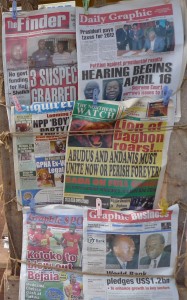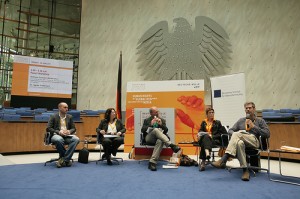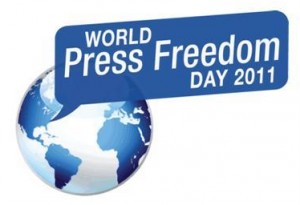Search Results for Tag: freedom of expression
Degrees of freedom: Shaping the internet’s future
 The fourth Freedom Online Conference Free and Secure Internet for All will be held in Tallinn, Estonia, from April 28th to 29th 2014 (#FOC14). This conference will bring together high-ranking representatives from the 22 member states of the Freedom Online Coalition – among them the US, Germany, Brazil and host Estonia. They will join up with a large number of civil society actors ranging from NGOs promoting internet freedom to large companies with a vested interest in all things internet like Google.
The fourth Freedom Online Conference Free and Secure Internet for All will be held in Tallinn, Estonia, from April 28th to 29th 2014 (#FOC14). This conference will bring together high-ranking representatives from the 22 member states of the Freedom Online Coalition – among them the US, Germany, Brazil and host Estonia. They will join up with a large number of civil society actors ranging from NGOs promoting internet freedom to large companies with a vested interest in all things internet like Google.
DW Akademie’s Holger Hank highlights the four most pressing issues from the perspective of media freedom.
![]() read more
read more
Laura Schneider: Press freedom rankings ‘problematic’
 Every year, press freedom bursts into the media limelight when the freedom of press indexes are published. But these international rankings should be treated with caution, warns Laura Schneider, a media freedom expert at the Research Center for Media and Communication in Hamburg. Schneider is analyzing annual press freedom rankings for her PhD thesis. She says that although the rankings are still important, they are not free from bias or based on sound methodologies. She is working on developing an alternative method of measuring press freedom.
Every year, press freedom bursts into the media limelight when the freedom of press indexes are published. But these international rankings should be treated with caution, warns Laura Schneider, a media freedom expert at the Research Center for Media and Communication in Hamburg. Schneider is analyzing annual press freedom rankings for her PhD thesis. She says that although the rankings are still important, they are not free from bias or based on sound methodologies. She is working on developing an alternative method of measuring press freedom.
DW Akademie’s Christine Harjes talked to Laura Schneider about the problems of, and possible solutions to, the press freedom rankings.
![]() read more
read more
Wikileaks: the right to know vs. the right to privacy

Deutsche Welle Global Media Forum 2011: Leaks, Wikileaks, whistleblower - New challenges for human rights?
This week a year ago, WikiLeaks founder Julian Assange first met with editors from the New York Times, the Guardian and Spiegel magazine to discuss how to investigate and publish hundreds of thousands of classified documents about the wars in Afghanistan and Iraq. The question at the heart of the meeting was how to reconcile the public’s right to know and the right to privacy of the people mentioned in the published logs by WikiLeaks?
Eric Schmitt, senior writer and Washington correspondent for the New York Times, gave an insider perspective on this crucial meeting at Deutsche Welle’s recent Global Media Forum. He says at the time, Mr Assange had not really thought through what impact the release would have for the individuals on the ground – especially in Afghanistan and Iraq, and had not made any plans to censor individual names.
So what responsibilities does the media have when it comes to protecting sources, and protecting people who may be put a risk as a result of leaked information?
Have a listen to the panel discussion between Dr. Agnès Callamard, Executive Director of the NGO ARTICLE 19, Eric Schmitt from the New York Times, Professor Beate Rudolf, Director of the German Institute for Human Rights and Jan Michael Ihl, spokesperson for Open Leaks.
You can also leave your comments within the timeline of the SoundCloud audio file.
W11 – Leaks, WikiLeaks, whistleblower – New challenges for human rights? by dwgmf
Press Freedom and Windhoek – 20 years on
It's worth noting that this year's World Press Freedom Day coincides with the 20th anniversary of the Windhoek Declaration on Promoting Independent and Pluralistic Media.
Take a moment in your day to check out the document.
At a first read though, you could not be blamed for thinking that much of what was noted in point 6 of the declaration could apply in many African countries in 2011.
"In Africa today, despite the positive developments in some countries, in many countries journalists, editors and publishers are victims of repression – they are murdered, arrested, detained and censored, and are restricted by economic and political pressures such as restrictions on newsprint, licensing systems which restrict the opportunity to publish, visa restrictions which prevent the free movement of journalists, restrictions on the exchange of news and information, and limitations on the circulation of newspapers within countries and across national borders. In some countries, one party States control the totality of information."
![]() read more
read more





Feedback